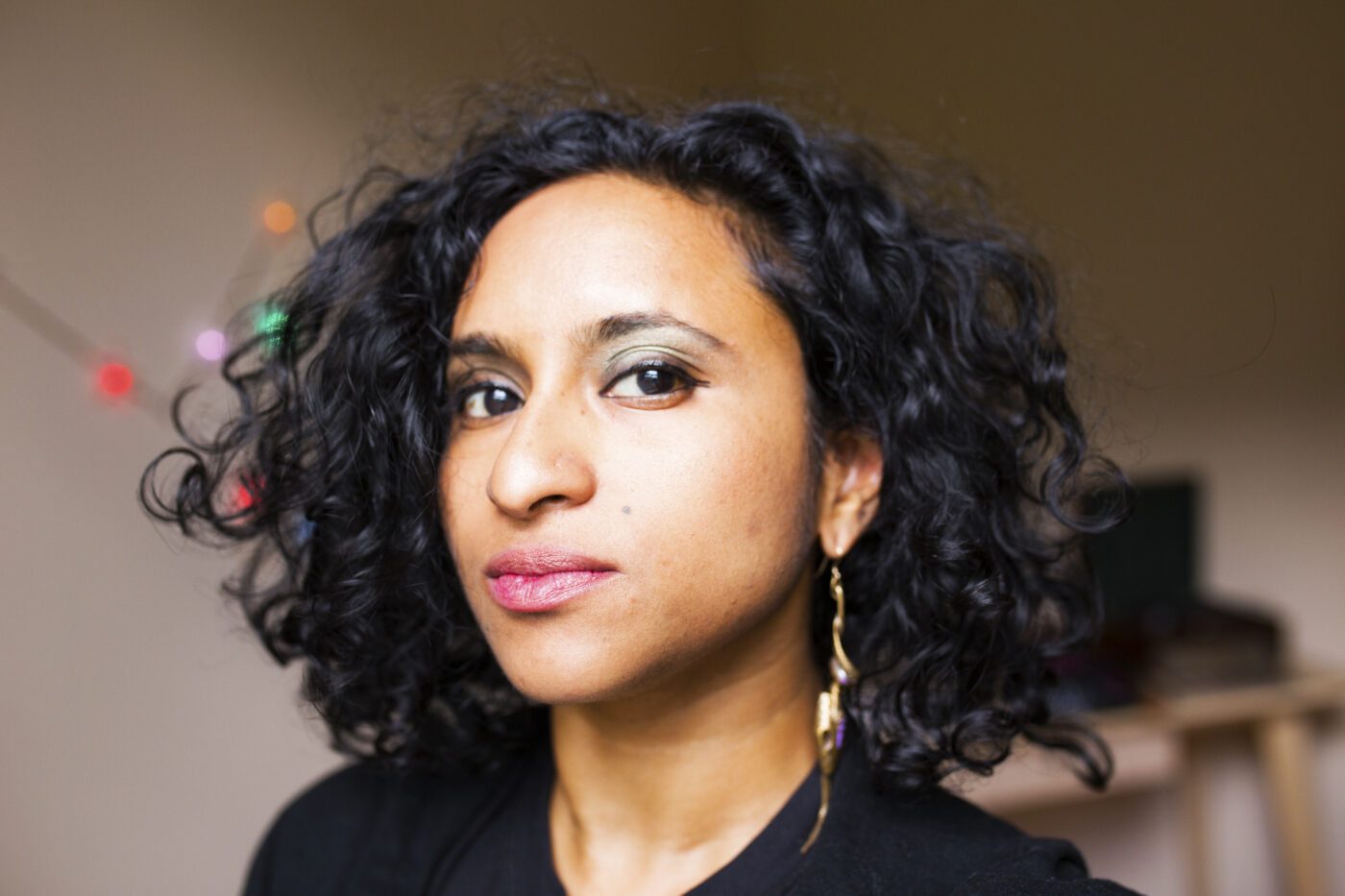The

“There is nothing new under the sun, but there are new suns.”
–
Octavia
E. Butler

4–6 minute read
or the time it takes
to make a smoothie.
Personal horizons are among the most exhilarating and fulfilling, but when they shift, out of either happenstance or necessity, the result is disorienting. For this issue, poet Tarfia Faizullah reflects on how she has navigated public success amidst private instability, found comfort in vulnerability where there was once shame, and rekindled a playful relationship with writing. In doing so, she confronts our desire to prove ourselves and recasts smallness as a thing to strive for.
BY TARFIA FAIZULLAH
My younger self gawked as I turned down covetable opportunities. But the terror of performing as someone I was expected to be, but could no longer sustain, froze me in place. Mashallah, writing stayed.
A few years ago, I started saying, “I just want to be small again.” Why?
But first, a backdrop. On March 8, 2006, I was an undergraduate attending an International Women’s Day panel where Mahmud Rahman read from a novel about the birangona, Bangladeshi women raped during wartime. That novel was The Search by Shaheen Akhtar. My life changed, listening, and that is not hyperbole. I began to write Seam, a collection of poems influenced by the time in Bangladesh I’d eventually spend interviewing those very survivors. Exactly ten years later, I found myself at Harvard Law School on International Women’s Day as one of 50 Women Inspiring Change alongside Sonia Sotomayor, Elizabeth Warren, and other luminaries I still can’t imagine being on the same list as—just for writing poems.
During that time, I was privately destabilizing. The combination of a chaotic personal life and the overnight pressure to be “great” had started to take its toll. I felt compelled to prove myself to certain writers and institutions. That particular hamster wheel is a dead end, one learns soon enough. We are programmed to keep running on it not just past our capacity, but elegantly, and fearfully. I’m talking about respectability politics, and how artists can be idealized, fetishized, flattened, punished, and/or cancelled alongside the acknowledgment and accolades accompanying artistic contributions. Seam, though, was written away from those apprehensions—she exists because I couldn’t stop thinking about the inner lives of abused women.
The following years were quieter. I shut down all social media. Struggled with bitterness brought on by harassment and racism in institutions that were paying my bills, all while feeling obligated to take on more labor, lest I seem ungrateful. Felt guilt for my unhappiness. Strove not to bring that darkness to my students and peers by isolating myself. My younger self gawked as I turned down covetable opportunities. But the terror of performing as someone I was expected to be, but could no longer sustain, froze me in place. Mashallah, writing stayed. I wrote a whole pained book that will never see the light of day.
I’m not saying anything new. Imposter syndrome, and burnout, are all too common a commiseration in any field. Perfectionism, though, is a horrific battle waged privately behind closed doors, and at great personal cost.
I just want to be small again. To be in awe of art’s possibilities again? Yes, and to slow down enough to still “see” the page: not as a place to affix proof of being good enough, but an expanse large enough to encompass the full dynamic range of any human’s attempt at precision. For me, the origins of writing began in childhood, in reading, and with wonder. I’d lost touch with that self somehow. I missed her, and needed her, desperately. With her help, I confronted the shame of lies told to keep other kinds of shame at bay. I started to lose folks; some of my new friends didn’t like who I was becoming. I was—am—becoming myself. In an interview, I said I was okay with losing people. I’m not—it always hurts. I am learning to coexist with hurt, and value it without letting it take over. In that same interview, I also discussed reprogramming myself away from the white gaze, but I disagree with that term now: it implies a return. No. I’m not going back. It is de-programming that invests me now.
So. It is 2021. You already know the national and global crises we are up against. I’m working on a new book called Alien of Extraordinary Ability. The title is a visa classification for a person who has demonstrated a high level of achievement in their particular field. She wouldn’t exist without her two predecessors: books that seek to understand the pain of the past. It feels different: lighter somehow. There’s a gladness in the making. Through Alien, I’m questioning our cumulative need to prove ourselves. I used to romanticize burnout, and artists who committed suicide by their forties. The changes I’m trying to make aren’t radical and don’t solve everything; they are commonplace and everyday. Perhaps that’s why they are tenable and keep me sane. I’m back on social media, but I take regular breaks. I laugh with friends. Sometimes I make smoothies, lol. I’m working on developing a relationship to writing that is athletic, and playful. I am smaller—I must be, since I am more okay with taking up space as myself, whereas before, I shrunk the parts of me I thought others didn’t want me to be.

[ID: Tarfia, a brown person with curly black hair and one gold snake earring, looks at the camera.]
Tarfia Faizullah
Pronoun: Tarfia
Dallas, TX
Tarfia Faizullah is the author of two poetry collections, Registers of Illuminated Villages (Graywolf 2018) and Seam (SIU 2014). In 2016, Tarfia was recognized by Harvard Law School as one of 50 Women Inspiring Change. Tarfia is a 2019 United States Artists Fellow, and lives in Dallas, TX. Tarfia does not have a favorite color.
